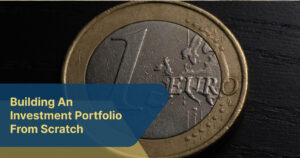
Building an investment portfolio from scratch can seem daunting. But with some help, you can easily make your first step.
- The earlier you start investing money, the better your chances.
- There are many different approaches to investing.
- You need to be informed.
- Past performances do not guarantee future returns.
- Any investment involves risks, and high returns are not guaranteed.
- Despite crises, stocks have proven to provide high returns over the long term.
- Big advantages of EFTs are their low fees and the spreading their risk.
Investing For Beginners
The earlier you start investing money, the better your chances of achieving an attractive return. Investing money is possible with individual assets, such as stocks and bonds, real estate or precious metals, or with funds and ETFs.
When investing money for beginners, the most important thing is your investment strategy. There are many different approaches to investing: active or passive, sustainable stocks, and growth strategies, including focusing on growth stocks or dividends providing passive income.
Before making any investment, you need to be informed. Not only on the various financial investment options, wealth accumulation, and various products. For example, if you want to invest in stocks or other securities, you can review annual reports and information on individual stocks or EFTs.
You must understand the process of making investments and be aware that past performances do not guarantee future returns and any risk associated with any investment. Any investment involves risks, and high returns are not guaranteed. However, when investing long-term, they are usually recouped over the years.
How To Start Investing In Stocks
A share is a participation right in a company, more precisely, in a stock corporation. Anyone owning a company share is a co-owner and may have a say in the company’s policy at the Annual General Meeting (AGM). However, most investors use shares as a financial investment. Profiting when business is good through increased share prices, generating a profit when sold in the future.
Additionally, the increased share value, the dividend, usually result in financial benefit to the investor. When the company makes a profit, it usually distributes some of it to its shareholders, known as a dividend payment. At the AGM, the decision if and how much will be paid out as dividends, while retaining some to build reserves or make future investments.
Over the past decades, a diverse stock portfolio has grown more than a savings account. Despite crises, stocks have proven to provide high returns over the long term, unlike short-term or low-risk investments. Over 44 years, an index fund tracking the performance of the MSCI World index has generated an average annual return of around 6.7% on a euro basis. The MSCI World index includes more than 1,600 companies from 23 countries.
Help To Invest In Stocks
The more time you can give to your investment, the lower the risk of having to sell in a crisis.
Investing In EFTs For Beginners
Compared to stocks and bonds, ETFs include benefits, especially active funds, giving them an edge over direct assets. Unlike active investment funds, it is easy to see their composition based on existing indices and previously tracking them. Active investment fund investors are usually unaware of the proportions of any securities at any time, as the fund companies only share this information periodically.
EFTs can also be traded at any time on the stock market. Making them ideal when wanting to turn securities into money. While other investment funds can take time to sell, these shares are returned to the company, taking only a few days until the money reaches your account. With active real estate funds, a hold period prevails, resulting in you being unable to sell the unit until a certain time period has elapsed.
A big advantage of EFTs is their low fees, especially compared to active and passive fund indexes, compared to active funds. ETFs impress in two ways; their cost-effectiveness and their total costs.
You don’t pay a front-end load when you buy ETFs because you buy them on the stock market. With active investment funds, there can be up to 5% of the investment amount.
Also, the total costs of EFTs are different from that of active funds. Total costs average 0.48% per year, while the average active mixed funds are around 2.26%, making a huge financial difference over time.
Unlike other funds, EFTs are diverse in spreading their risk; the more variety in assets, the lower the risk. The main advantage is that investors don’t have to mitigate this diversity by buying the assets individually.
How To Start Investing In Real Estate
Only by understanding how much you can realistically afford to spend can you determine the range of the property you can purchase. Then you need to decide if you want an apartment or an apartment building to determine your budget. While an apartment building may offer a higher return, you need an increased equity deposit. While working out a plan for your success can be time-consuming, it does give you direction to pursue your goals.
When choosing the property, the location is essential before purchasing, not only location but also aspects such as the infrastructure and transportation.
To prevent high costs, you must ensure the property has no significant defects in the build quality. Checking for cracks in the brickwork or getting in an expert can help before you commit to any purchase.
You can also understand your profit yield in advance, but this depends on the tenant, assuming they pay on time and don’t default. Also, when owning any property, unexpected costs can arise. For personal protection, you should ensure you have a financial cushion for such moments.
How To Fund Real Estate Investment
Buying real estate is always expensive. There are the purchase and other ancillary costs. At least 10% of the purchase price is needed to cover additional costs.
Using credit or a mortgage to finance the purchase is common and often advantageous. With current inflation, the expectation is when paying the loan, there will be some depreciation to money, giving you an advantage. Plus, it is possible to offset the loan against your tax burden, depending on how the property is intended to be used and your circumstances.
In summary, a successful real estate investment depends on finding a good deal and cheap financing. This still applies in old age. The profits are located in the purchase.
What Can Affect Investment Portfolio Value?
Many developments impact your portfolio’s performance, with the biggest factor being the market, known as a systematic risk. There is commonly a correlation between assets. Market hype, rumors, trends, and press reports can drive asset price changes.
Recommended Investment Books
To build your knowledge about “how to start investing,” consulting books or pdfs is worthwhile. The only challenge is understanding which resource will provide the best knowledge, and reviews aren’t always reliable.
Our recommendation is to use our article, FAQs, and guides. All information shared is correct and includes proven tips to give you a clear overview. All are completely free; there is no downside! Plus, if you have any questions, we can contact you at any time.




